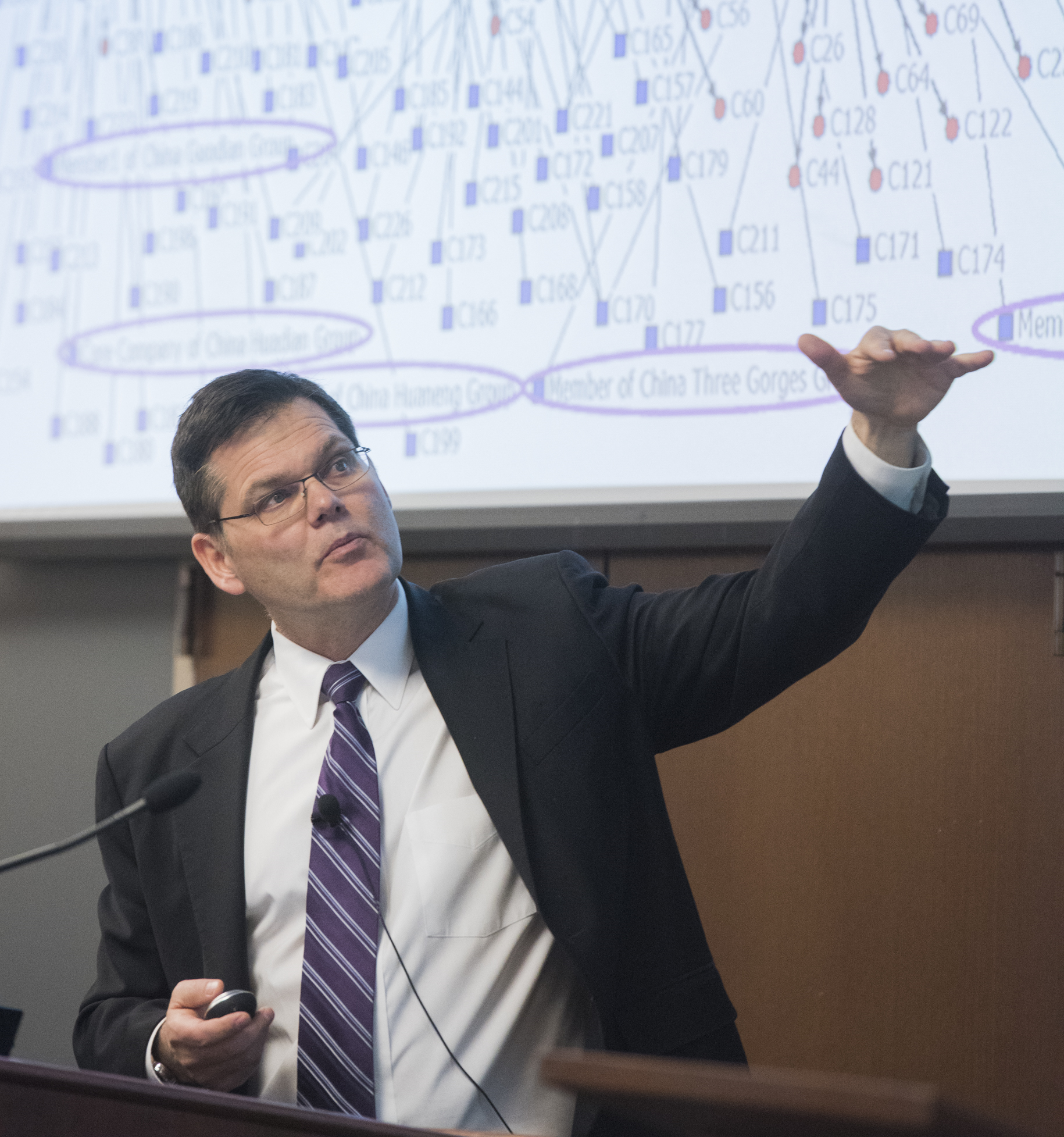By: Marla Borkson
Date: February 23, 2015
This Tuesday February 17, 2015 Professor Curtis Milhaupt delivered The 8th annual William C. Jones Lecture to students, faculty, and professors. The lecture was cosponsored by the Whitney R. Harris World Institute and the East Asian Languages and Cultures Department. Professor Milhaupt is a professor at Columbia Law School in New York and a leading authority on comparative corporate governance, state capitalism, law and economic development, and the legal systems of East Asia. He has testified before Congress on the national security implications of bilateral trade and economic relations between the U.S. and the People’s Republic of China.
Prof. Milhaupt’s lecture was based on his research for two recent papers. Milhaupt asserts that the Chinese economy is a species of corporate capitalism that might be called a “State Oriented Economy.” Milhaupt argues that the global economic regulatory regime is not set up for this type of economic structure. Policymakers are thus faced with many difficult issues in how to deal with Chinese firms active in the global economy.
In the first part of his presentation, Prof. Milhaupt outlined the “organizational ecology” in which the state sector operates. The State-Owned Assets Supervision and Commission (SASAC) acts as a controlling shareholder of about 115 SOE corporate groups, including many Fortune 500 companies. SASAC is a complex entity, and according to the Wall Street Journal, is a “central holding company,” as well as the majority shareholder in a “core company.” The core company, in turn, owns a majority of shares in the state-owned companies that comprise the group, including a finance company that is a source of finance for members.” President Xi’s 2013 SOE reform platform pushed for an increase of private ownership in SOE firms.
His second paper stresses that focusing only on equity ownership does not give a full picture of a Chinese company’s relationship to the state. In other words, the SOE-POE dichotomy is misleading. Milhaupt points out that ownership in many Chinese companies is mixed between SOE and private owned enterprises (POE). He used the example of ZTE, a telecommunication firm whose shareholders are ultimately 49% private and 51% state, suggesting that ownership does not necessarily determine if a company is SOE or POE. Additionally, Milhaupt argues that you cannot assume the state controls all aspects of an SOE. SOEs typically pay low dividends to the government, tolerate high levels of unregulated executive compensation, and sometimes refuse to implement government policies, most notably in the real estate sector. At the same time, POEs often have close personnel links with the government and receive subsidies from the state, just like SOEs.
Milhaupt thus argues that capture of the state is a more important facet of Chinese corporate capitalism than ownership of enterprise. In order to capture the Chinese state, Milhaupt argues that firms (whether SOE or POE) must demonstrate growth potential; once they do, they will receive market access, licenses and subsidies from the government.
This system, with its complicated foundations, has many legal and policy implications, ranging from Chinese economic reform strategy to antitrust law, anti-bribery law, and anti-subsidy law. Due to the mixed ownership and high degree of political involvement in many firms, the basic distinction between SOEs and POEs which runs throughout many laws may be unhelpful with respect to Chinese companies. For example, under the Foreign Corrupt Practice Act, a bribe paid to an SOE executive is unlawful, while a bribe paid to a POE executive is not, even though the POE executive may be closely linked to the government. Similar problems arise from anti-subsidy laws, which also depend on the private/public classification, as private firms are allowed to pay subsidies, while “government bodies” are not. The point is that basing these distinctions on the nature of equity ownership is not very helpful in the Chinese context.
In his concluding remarks, Professor Milhaupt stressed that it is in China’s best interests to be more transparent about links between the Party, the state, and economic enterprises. He believes Chinese firms will always bear a “suspicion tax” from foreign countries — suspicion due to the fact that the outside world cannot tell if the firm is linked to the government or truly private. He believes the way to remedy the situation is to remove the Communist Party from functioning within corporate structures, although he is highly skeptical that this will come about any time soon.

